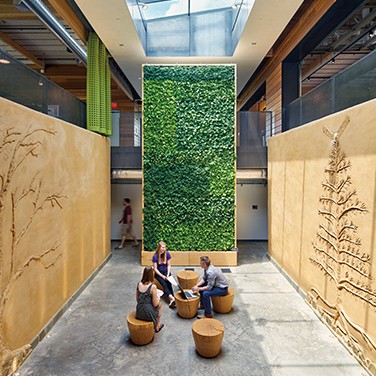Sustainability: The Science Protecting Humanity
By Mike Howie
In 1962, Rachel Carson bypassed traditional scientific channels to deliver a message directly to the American people: unchecked pesticide use could kill you. Those chemicals, which at the time were indiscriminately dumped on public and private lands alike, didn’t necessarily affect human health immediately. They weren’t always the clear cause of an illness. But scientific studies showed that chemical pesticides inflicted far more damage on wildlife, nature and humans than was originally thought.
In some cases, the chemicals not only failed to control pests but actually allowed them to flourish in the absence of natural enemies — all while vast amounts of tax dollars were spent to spread poisons that collected in the tissues of animals, crops and people. When Carson presented these findings in her best-selling book Silent Spring that year, she gave the power of knowledge to the public, and many citizens became enraged with their government. Her reporting threatened the status quo of public officials and multimillion-dollar chemical companies, who sought to discredit her work and slander her name. And, most importantly, she began a dialogue that sparked the environmental movement and initiated a series of events that would produce the United States Environmental Protection Agency.
Nearly 60 years later, we continue to struggle with living sustainably and responsibly. The listless, grounded birds Carson wrote of have been replaced with dead whales whose stomachs are filled with discarded plastic. The dying elm trees of her day are the bleached coral reefs of our own. Even with the best intentions of reducing, reusing and recycling, we tax our planet in ways that could take hundreds of years to correct. Part of this stems from a natural urge to resist change, but it’s also difficult to see the suffering forest through the seemingly verdant trees. The Earth is warming, but the weather isn’t so different from last year. Pollution abounds, but we still feel healthy. As in Carson’s time, the numbers and graphs that quantify our changing environment can be hard to decipher. It was her brilliant words that introduced many to the idea that we have to care for our environment in order to care for ourselves.
"Ultimately, you care about the planet because you care about people."
Carson’s passion for our planet and its inhabitants continues to thrive at Chatham University, the alma mater she knew as the Pennsylvania School for Women. Nestled in the Shadyside neighborhood of Pittsburgh, Pennsylvania, Chatham’s main campus features a 32-acre arboretum with 115 species of plants. Homes and buildings from the city’s industrial days, including one formerly owned by businessman and banker Andrew Mellon, are now used as dorms, offices and classrooms. Following Carson’s lead, the university cares for campus grounds without using chemical pesticides, and they’ve taken a number of steps to infuse every aspect of their operations with a sustainable mindset. No bottled water is sold on campus. Used cooking oil is sent to a local biodiesel plant. Tax breaks are given to employees who bike to work. “I don’t know any university that has [sustainability] in its DNA as much as Chatham does,” said Peter Walker, PhD, dean of the university’s Falk School of Sustainability and Environment.
The full extent of Chatham’s sustainability expertise is found 20 miles north of the main campus in Richland Township, Pennsylvania — an aptly named area complete with rolling hills, lush woodlands and fall colors that rival the best New England has to offer. This is home to the university’s Eden Hall campus and the Falk School, where students come to not only study sustainability but live it. The campus features over 400 large solar panels, a residence hall with the largest installation of radiant heating and cooling ceiling panels in the country, over 30,000 square feet of rain gardens, a variety of growing environments, on-site wastewater management and much more. Lessons in sustainability can be found in every aspect of the campus. But the school does not define itself with high-tech buildings, and it doesn’t pursue sustainability for holier-than-thou credibility. Instead, the palpable goal is to solve real problems in real communities, to leave the Earth better than they found it and to set a lasting example for future generations. “We’re not trying to be the techy leaders,” Dr. Walker said, “we’re much more on the people side.”
Dr. Walker greets incoming sustainability students with two questions: “How many of you are angry about the way the world is, and how many of you think my generation screwed up your life?” Both are answered with a sea of raised hands. “I love that, it means they are passionate,” he said. “What I say is I want you to keep that anger, I want you to keep that passion. What we’re going to do is give you the smarts to be able to do something with it.” Those smarts are imparted not just in the classroom, but also in the fields and forests of Eden Hall and communities in and around Pittsburgh.
Unlike other sciences, sustainability labs are not bound by geography or a single discipline. Sustainability scientists work to solve real-world problems, which have no real boundaries. Projects that start simply can quickly expand into other fields of study. A recirculating fish farm, for example, can become a project on the economics of growing fish food instead of purchasing it. A lab about green infrastructure can expand to include human motivation and communication if the crews tasked with installing it aren’t properly trained. To see just how quickly these projects change course, Chatham students are given real-world problems to solve in the field.
“People learn by doing things, primarily,” Dr. Walker said, “and they learn even better if they make mistakes and if they’re having fun.” With that idea driving Chatham’s pedagogy, the university partners with businesses and communities to make a difference in the lives of students and citizens alike. In Homewood, an economically challenged neighborhood of Pittsburgh, students are working on an ecovillage project that aims to revitalize the area without causing gentrification that could drive residents from their homes. In partnership with local farmers, they’re developing a method for growing shiitake mushrooms using resources commonly found on Pennsylvania farms, which could add an additional $5,000 to a farmer’s annual income. Students even intern with local government offices to get a first-hand look at what it takes to drive sustainability efforts in a major city.
Chatham’s educational aspirations don’t end with students. The Eden Hall campus was purposely designed to blend in with the surrounding community, and locals are invited to campus for a variety of events, including weddings, outdoor concerts, summer camps, and classes that include fermenting everything from wine to kimchi. By giving so many people a first-hand look at what it means to be sustainable, Chatham exemplifies the idea that sustainability starts locally. And by letting their pupils learn from failure, they teach that it’s more important to try than it is to be perfect.
"Don’t seek perfection. Seek workable solutions."
“One of the things that I’ve learned in my life is that perfection is the death knell of progress,” Dr. Walker said. “Don’t seek perfection. Seek workable solutions.” In other words, it’s possible that what we think is a sustainable solution today may in fact prove to be unsustainable in the future; what we really need are models that are good enough and can be applied now. As our knowledge of sustainability grows, those models will evolve and lead us to a sustainable future, one step at a time.
“Ultimately, you care about the planet because you care about people,” Dr. Walker said. That same moral imperative inspired Carson to write Silent Spring. When she published her book, she did so as an outsider with no PhD or academic affiliation. Fully aware of the fierce criticism she would receive, she persisted in working to clearly present scientific evidence to a public that had a right to know. And she defended that work in front of her country even as cancer spread through her body. She did this not to earn a posthumous legacy, but to stand up for the continued prosperity of humanity as a whole, even though she would never experience the brighter future she helped create. “You’ve got a good soul, so you care about people and future generations, and people you can’t see on the other side of the world,” Dr. Walker explained. “That’s really sustainability. It’s not complicated.”



